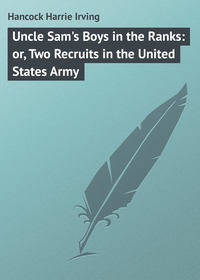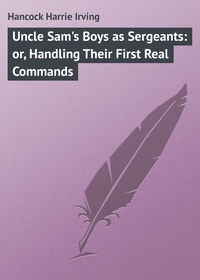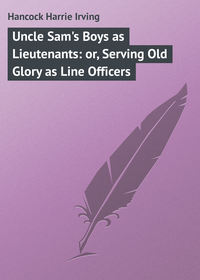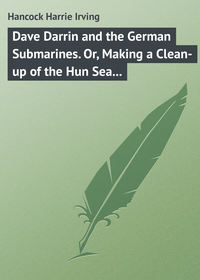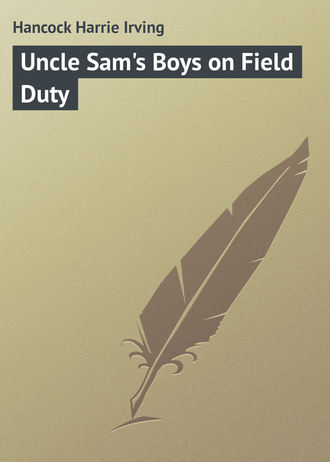
Uncle Sam's Boys on Field Duty
The young physician was now feeling the cut on Hal's head, the skilled fingers glided easily along the edges of the wound, pressing lightly against the bones of the skull.
"This couldn't well be much worse," announced the physician, looking up. "But before I do much, or make a thorough examination, I want this soldier in bed. Have you a surgeon at camp?"
"No, sir," replied Sergeant Hupner.
"Then I'll get out my automobile and take the young man up in the car, after washing the cut and putting on a first bandage."
CHAPTER XIX
A DISPUTE IN THE GUARD HOUSE
OF the ride that followed back to camp Hal Overton knew nothing.
Noll Terry sat beside him, supporting him.
Of course the automobile reached camp a long time ahead of the detachment with prisoners.
Captain Cortland caught sight of the car and came hastening to meet it.
Noll Terry leaped out, saluting.
"Sir, I have to report that Corporal Minturn assaulted Private Overton, and that we called in a physician, who has brought Overton out here."
"How badly is Overton hurt?" demanded the captain, hastening to the side of the auto.
"Badly," replied the physician. "Have you any facilities here for the care of a man who may have brain fever if he lives for the next forty-eight hours?"
"We have a hospital steward and four hospital corps men," replied Captain Cortland.
"And bandages and medicines?"
"An abundance of them."
"Then your soldier lad may have some show. He'll no doubt be better off here than among strangers in town. When do you start back to your post, Captain?"
"In the morning of the day after to-morrow," Cortland answered. "One moment, please. Sergeant Gray!"
The first sergeant hurried up, saluting.
"Sergeant, send the hospital steward here. Then see that a hospital tent is taken from one of the supply wagons and set up at once and make the patient as comfortable as possible."
Within ten minutes the tent was up, with a cot, a table, two chairs, bandages, medicine chest and other accessories.
Now, with the help of the steward, the physician gave the injured soldier boy a very thorough examination, washed the gash carefully and bandaged it.
Directions were left with the steward, who was a trained nurse, and then the physician returned to town, after having been requested to call again on the following day.
Hal Overton knew little, and that little in a dreamy, disorganized way, even when his cot was carefully placed and secured in one of the transport wagons for the return to Fort Clowdry.
The roughness of the first part of the ride brought on mild delirium. Two days later, however, after being placed on a cot in the military hospital at Fort Clowdry, Soldier Hal opened his eyes with a keener realization of the world about him.
"How do you feel, Overton?" asked one of the hospital corps men, bending over him.
"Like a fool," sighed Hal.
"Why?"
"A youngster like me has no business wasting time in hospital. Can I get out to-day?"
"I'm afraid not," smiled the hospital corps man.
"I'm not badly hurt, am I?"
"If the rainmaker knows his business, you've had a fight for your life, and youth and a good constitution have won out."
"How long am I to be here?"
"You'll be here for three or four days yet," answered the hospital corps man.
"But – "
"That's about all the talking you'd better try to do until the rainmaker has seen you," interposed the hospital corps man, and moved away as he added:
"Either sleep, or just keep quiet."
But the next morning Hal was so much improved that the hospital corps man took a chair by the bedside.
"You may want some of the news, Overton, about things that have happened while you've been here."
"I am just a bit curious," smiled Overton.
"Three of the delinquents got off with ordinary summary court punishments – fines and a little stretch at the guard house. But Minturn, Dowley and Hooper are locked up there, too, and they've got to wait and stand court-martial. Their day in the Army is ended, I reckon."
"It ought to be," nodded Hal. "They're no good to the service."
Noll was allowed to come in for a few minutes that afternoon.
Eight days passed ere Hal Overton was released from hospital. Then the surgeon marked him "quarters" on sick report, which meant that Private Overton was excused from all duties, and must spend his time in taking care of himself only.
For four days he continued to be marked "quarters," chafing all the time.
"There's a lot I've got to learn about the soldiering business," he grumbled. "I haven't any time to waste loafing."
"There's one soldierly duty you can learn right now, then," smiled Soldier Noll quizzically.
"What's that?"
"You can learn how to obey the rainmaker when you fall under his orders," replied his chum indulgently.
"How does an impatient fellow learn that, I wonder?" sighed Hal.
"Why, what are you kicking about?" demanded Noll in pretended astonishment.
"You're surely not being overworked, and you're getting in trim for the next work we have cut out for us."
"What's that?"
"Haven't you heard?"
"Not a word."
"Why, the whole battalion, except for a small guard squad from each company, is to be ordered to the September encampment of the Colorado National Guard. The regulars are to be represented there by field artillery, cavalry, infantry, signal corps men and engineer troops. Hal, it's going to be great! There'll be more than eight hundred regulars and two brigades of militia in camp together."
"It won't do me any good," retorted Private Overton cynically.
"Why not?"
"I'm just out of hospital, and I'll be stuck on the home guard detail from B Company."
"Oh, I don't believe that," urged Noll soothingly.
"Wait and see."
There came a morning when Private Overton marched over to hospital with the other men on sick report.
"You seem to be doing pretty well now, Overton," remarked Lieutenant Gross, the surgeon.
"How are you going to mark me, sir, to-day?" breathed Hal anxiously.
"Duty," smiled the rainmaker.
"Thank goodness," murmured the soldier boy.
"Why, what's the matter with being marked quarters, Overton?"
"Fine, for a loafer, sir, but I want to learn the soldier business, and I haven't any time to lose."
"From all I hear," remarked the rainmaker, "you're learning the soldier business fully as rapidly as you need to."
"There's a lot more I want to know, sir, and it can't be learned when a man is marked 'hospital' or 'quarters,' sir," Hal returned. "Thank you for marking me 'duty.'"
"There's a real soldier, or I'm too green to be an officer," thought Lieutenant Gross, as his eyes followed Hal, who, erect and full of spring, was striding from the room.
On the third day after his return to duty Hal was warned for the guard. The following morning he turned out to be inspected with the new guard.
As he was not assigned to the first relief, Hal seated himself inside the guard house, picking up one of the books that rested on a table there and began reading.
Presently the other soldiers sauntered outside, and Soldier Hal was left there alone.
"Overton!"
Hal laid down his book, rising and stepping over to a cell door to find Dowley's eyes glaring at him balefully.
"You sneak, you're responsible for getting me into all this trouble!" hissed the soldier in arrest.
"Dowley, you know very well that the rules forbid a member of the guard from talking with a prisoner, except when the talk is strictly in the line of duty."
With that Soldier Hal turned and went back to his book.
"You could have gotten out of that place in Mason City when I told you to," went on Dowley hoarsely. "Then all that followed would never have happened."
Hal went on reading.
"Say, Hooper," muttered Dowley aloud to the man in another cell, "as a fresh kid ain't that fellow the end of the world?"
"He's a boot-lick," jeered Hooper.
"He just sneaks around the officers, telling 'em lies so as to get things easier for himself," broke in Corporal Minturn from still another cell. For these three, unlike the ordinary run of guard-house prisoners, had been placed in separate confinement.
Hal read on, though the color mounted to his cheeks.
"You dirty dog!" cried Dowley hoarsely.
"Lying sneak!" from Bill Hooper.
"Two-cent boot-lick!" was Corporal Minturn's contribution.
Hal laid down his book, rose and stepped over to where he could look at the three, one after another.
"If you men don't hold your tongues," he warned coolly, "I shall have to report you to the corporal of the guard for abusive talk. I don't want to do that, either."
"Oh, my, a little bit of authority!" sneered Corporal Minturn.
"Tin general!" taunted Dowley.
"Go and boot-lick some more!" urged Bill Hooper.
"Corporal of the guard!" summoned Soldier Hal.
Corporal Sykes entered promptly.
"Corporal, these men in solitary are amusing themselves by heaping insults upon me. I don't report them, Corporal, on account of personal feeling, for they're down on their luck, and they hold me responsible for it, as in a measure, of course, I am. But I don't want to get on the record for laxity while on guard."
"Quite right, Overton," nodded Corporal Sykes. Then, turning to the three "solitaries," he demanded:
"Why are you prisoners guilty of insulting and abusive language toward a member of the guard?"
"He's too well satisfied with himself," sneered Bill Hooper.
"Ditto," scowled Dowley.
"What have you to say, Minturn?" demanded Corporal Sykes.
"The kid just sat down there to make us mad," replied Minturn in a growling voice. "The sight of that boot-lick makes me sick all over."
"That's all I want to know," replied Corporal Sykes calmly. "You've all admitted the abusive language, so I'll enter it on report, which will be brought up at court-martial. If there's any further report about you men I'll mention the matter to the officer of the day. Where are you going with that book, Overton?"
"Since the sight of myself disturbs the prisoners," Hal replied, "I am going to take my book outside."
"I'd rather you wouldn't," replied Corporal Sykes crisply. "Members of the guard have a right in here, and prisoners who don't like a member of the guard had no business to become prisoners."
CHAPTER XX
PROMOTION FLIES IN THE AIR
A FEW days later the court-martial was convened at Fort Clowdry.
In the cases of the three "solitaries" the evidence was speedily in.
With the evidence furnished by Hal, Noll, Hyman and others, the accused delinquents were found guilty.
At the trial there had come another surprise. Evidence had just been forwarded from the recruiting office where Dowley had enlisted. This evidence showed that Frank Dowley was a highly respected man in his own part of the country, but he had left home and gone hundreds of miles away for new employment.
The prisoner who stood before the court as Dowley was Frederick Cramp in his own proper name, and had served a term in jail for robbery. Cramp had a generally bad reputation. Finding himself closely pursued by the sheriff's officers for a newly committed crime, Cramp had seized upon the inspiration to enter the Army under the assumed name of Dowley. In the ranks he believed that none of the pursuing officers would think of looking for him.
The references of the supposed Dowley had come back from the home town with such splendid endorsement that the enlisting officer had imagined that he had found a most satisfactory recruit in Frederick Cramp.
It is likely that the deceit would never have been discovered, had not Frank Dowley – the real one – lately returned to his home town. He had been astounded when his friends had questioned him about Army life, and, on hearing the news, had hastened to the nearest recruiting office, from which this strange story had come to be laid before the court-martial just in time to punish the culprit.
"Dowley" was sentenced to be dishonorably dismissed from the service, with forfeiture of pay and allowances, to serve one year at a military prison and then to be turned over to the civil authorities for such further punishment as might develop.
Corporal Minturn, too, was sentenced to be dismissed from the service, and to serve one year at a military prison.
Private Bill Hooper got off with simple dismissal.
Then the prisoners were sent back to the guard house until the findings and sentences had been passed upon and signed by the department commander.
A week later the papers were returned with the endorsement of the brigadier general commanding the department.
Dowley, Hooper and Minturn left under guard the same day.
"They're all generals now," mimicked Private Hyman.
"Generals?" queried Noll.
"Yes; general prisoners."
"Bill Hooper will be on the retired list when he reaches Denver, anyway," smiled Hal. "Having no stretch to serve, he's to be turned loose when the guard reaches that city."
The morning after, as Colonel North sat in his office at headquarters, an orderly entered and handed him a telegram.
"Orderly!" called the colonel crisply two minutes later.
A young soldier of the guard stepped in, saluting and standing at attention.
"Orderly, my compliments to Captain Cortland, and ask him to attend me here as soon as possible."
Five minutes later B Company's commander entered and saluted.
"Take a seat, Cortland," urged the older man. "I have a telegram here that will interest you. It's from the senior surgeon at department military hospital. Corporal Hapgood, of your company, who was sent there for treatment, died yesterday. A very bad case of typhoid had developed."
"Then poor Hapgood won't be sent back here for burial, sir?"
"No; the dispatch says that the corporal is being buried there to-day."
"I'm sorry for Hapgood," said Captain Cortland solemnly, a slight break in his voice. "He was a man, every inch of him, and a fine soldier with big promise for the future. I have his mother's address, and I will write her. But the best kind of letter will seem a poor substitute for a son in the case of that lonely old mother. He was all she had."
"The mother will be able to draw a pension of twelve dollars a month for the rest of her life, then," replied the colonel. "That is something, even if not as good as having a live son to comfort her."
"Yes; the pension will be assured," mused Captain Cortland.
"By the way, Cortland, you are now shy on two corporals in your company."
"Yes, Colonel; I was about to speak of that to you."
"Whom do you want appointed in their places?"
The colonel of a regiment appoints all non-commissioned officers in his regiment; he also "breaks," or reduces them to the ranks at his pleasure, if any need comes up.
But, though the colonel has the appointive power, he always consults with the commander of a company about any new appointments of non-coms. in that company.
"I have several good men who are entitled to appointment," replied Captain Cortland slowly.
"Then you haven't made up your mind?"
"I can, easily, sir, if you wish it."
"I am thinking, captain, only of the fact that, if the appointments be not promptly made you will run very short on corporals," replied the colonel.
"There's Hyman, sir, and Conrad. Both are bright, attentive soldiers. Then there are Overton and Terry. They're quite new men, but they've made records for themselves in the short time they've been with us."
"Any others?" asked Colonel North, tapping his knee with the pencil that he held in one hand.
"A few others, sir, but none with quite as good claims as the four men I've named."
"Whom do you favor most, Captain?"
"It's hard to say, sir. Hyman is nearly through with his enlistment, and Conrad in the middle of his third enlistment. Now, from length of service it looks as though Conrad ought to have one of the appointments."
"A man who is well along in his third enlistment, and hasn't been made a non-com. in all that time ought not to have much consideration if there are other men with better natural claims," replied Colonel North. "A man who is thoroughly qualified to be a corporal ought to get there in less than seven or eight years, don't you think so?"
"That's true, sir," Captain Cortland nodded.
"Is Hyman as good a man as Overton or Terry?" continued the regimental commander, apparently much interested.
"He has had longer experience, but I think Overton and Terry are both a shade above Hyman in natural aptitude; in fact, the lads are considerably above him."
"Then – "
"I see your drift, Colonel, and I agree with you. I therefore urge, sir, that Overton and Terry be appointed as corporals, and I will keep Hyman in mind for the next chance that comes up."
"You are satisfied, then, Captain, to make Overton and Terry corporals?"
"More than satisfied, Colonel. One of these days they'll be sergeants, at that. A company commander, I take it, sir, can't start too early to fire the spark of ambition in the right men."
"You and I are agreed on that, then, Cortland. I am glad you have recommended Overton and Terry as corporals. I will have their appointments published in orders this afternoon."
No suspicion had Hal or Noll when they fell in for parade that afternoon.
When Lieutenant Wright, battalion adjutant, published the orders, he read off four routine orders before he came to that creating Private Hal Overton a corporal in B Company.
"Whew! It has come, but I didn't expect anything like that," quivered Soldier Hal. "I didn't think I could do it inside of a year."
"Lucky Hal," thought Private Terry. "He has gotten ahead of me, but I'm glad just the same. It has always been the rule for Hal to beat me, anyway."
The next order made Noll Terry's hair stand up. He had been made a corporal, too.
How the hearts of both danced when the regimental band played the headquarter's battalion from the parade ground.
"You two are the lucky soldier kids," cried Private Hyman, coming up to the boys with outstretched hands. "How did you manage it?"
"That's the point, Hyman," laughed Hal happily; "we didn't manage it. It just happened."
Before the quartermaster's store closed both soldier boys drew their corporal's chevrons, then hunted up the company tailor to get him to sew these prized badges of rank on their sleeves.
"I suppose, Sergeant, one or both of us will be transferred from your squad room," said Hal regretfully, when they encountered Hupner.
"I've heard nothing to that effect as yet, Corporal," replied the room sergeant.
"Corporal!" How wonderfully fine that simple title sounded, though the title meant but one step above that of plain private soldier.
"I'm sorry for one thing, Corporal," laughed Private Hyman, that night after supper.
"What's that?" Hal queried.
"I'm extremely sorry that your old chums, Hooper and Dowley, tired of the Army too soon to see your chevrons on your sleeves. Say, but I think those chevrons are about the handsomest I've ever seen," added Private Hyman, an undertone of wistfulness in his voice.
The next day brought more good news. The date was set on which headquarter's band and the first battalion of the Thirty-fourth was to leave for Denver, to take part in the summer encampment of the Colorado National Guard. Neither Corporal Overton nor Corporal Terry was assigned to the guard detachment that was to remain behind.
Lieutenant Greg Holmes, only a few months out of West Point, drew a "blank" that made his face look gloomy. Lieutenant Holmes was the only officer in the battalion who was to remain behind. He was to have command of the guard that was to take care of the post in the absence of the troops.
CHAPTER XXI
THE PRICE OF BEING A MAN
THE occasion was the encampment of the Colorado National Guard, and the scene was a few miles outside of Denver.
Here was some of the real glory of the soldier's life!
At the head of the line rode two troops of cavalry belonging to the regular Army.
Immediately behind these yellow-legs an awe-inspiring drum-major strode along, his glittering, ball-tipped staff going through many smart movements. Right behind him came the Thirty-fourth U. S. Infantry Band, crashing out a soul-stirring march.
At the heels of the band rode Colonel North, Major Silsbee and staff, a splendid, soldierly looking lot in saddle.
Then the head of A Company, Captain Ruggles commanding. B Company next, and to B Company fell the honor of being color company and escorting the Flag. C and D behind – the whole khaki-clad battalion moving at easy swing, and yet in the straight, precise lines that only regulars know how to display, however close near-soldiers may imagine they come in excellence. Over all, in brisk cadence, and in exact time to the spirited music ahead, sounded the steady whump! whump! whump! of the exactly gaited feet of regulars on the march.
No wonder the crowd that lined the sides of the road cheered! No wonder that girls waved handkerchiefs! Here and there men, youths and boys who knew enough lifted their hats as the colors passed.
It is strange that not all American males, of all ages, know that the hat is to be raised from the head and lowered to place over the heart as the national colors are borne by.
Yet all of those of the male spectators who did not know enough to uncover on the approach of the colors still felt the glory of the scene. Love of the military is common to all true-beating hearts. The country dies in which this love of the military vanishes.
Behind the infantry lumbered the guns and caissons of two batteries of field artillery, drivers alert and gunners sitting up very straight, yet appearing wholly at ease.
It takes the man of military experience to be both erect and at ease at the same time. Some civilians come very close in this achievement, but theirs is the imitation grace of personal carriage.
At the extreme left of the line marched a platoon of engineer troops and a detachment of men from the signal corps.
The regulars were now in the last half mile of the march down a beautifully shaded road that led to the broad fields on which the encampment was pitched this year.
Hundreds of boys were following the parade as a matter of course. Where is the live boy whose heart is dead to the soldiers?
As the Thirty-fourth's band played out the final notes of the march, the order for route step marching ran down the line.
Just then, from a parallel road less than a quarter of a mile away, another band blared forth in a quickstep. The crowd was quick to turn and look.
Through the intervals between trees and bushes could be seen another line of military. An entire brigade of the National Guard was over on that road, also headed for the encampment field.
"Hey, Tommie!" called one boy to another. "Cut across with me. There's about ten miles of sogers over there!"
"Chase yourself, if you wanter go," yelled back Tommie. "They're militia. Me for here, with the real-thing sogers, just back from the wars!"
There was a laugh from many in the crowd, while the smaller boys whooped. It was hard even for the erect regulars in ranks to repress their grins when they received that tribute from a discerning small boy.
But the small American boy, even if ignorant of everything else in the soldier's manuals, can usually be depended upon to know the difference between regulars and militiamen. To the small boy's mind the difference is as great as that between the circus and the country fair.
Uncle Sam's musicians struck up again, just as the column entered the encampment field.
Wagon trains had gone on ahead.
Regulars and national guardsmen broke ranks at nearly the same moment.
Then followed an exhibition that some of the spectators never forgot.
In about a half an hour the regular troops had their tents up, in straight, precise company streets, and all their belongings moved in. Nor were these the "dog-tents" of field duty. As the encampment was to last for a week, the regulars slept at night in full-sized Army tents, with several men in each tent.




